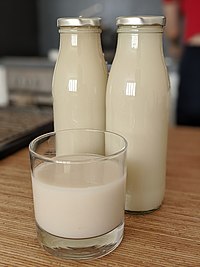
Photo from wikipedia
Abstract Heat treatment of milk is applied in the manufacture of cultured dairy products, primarily to increase viscosity and improve texture. Denatured whey proteins are recognised as mostly responsible for… Click to show full abstract
Abstract Heat treatment of milk is applied in the manufacture of cultured dairy products, primarily to increase viscosity and improve texture. Denatured whey proteins are recognised as mostly responsible for causing these textural changes. The higher isoelectric pH of whey protein triggers earlier acid-induced gelation. Rheological properties of acid gels made from heated milk exhibit significantly higher storage moduli (and lower fracture strain) due to alterations in gel microstructure and the contribution of covalent disulphide bonding. Gels prepared from heated milks also exhibit an increase in the loss tangent parameter due to loss of calcium phosphate crosslinks conferring a greater mobility within casein particles that are already part of the network. Casein interactions are mostly weak in these types of gels, and the balance between inter and intraparticle interactions, as well as the impact of denatured whey protein deposition on the particle surfaces, are discussed for their influence on acid gelation.
Journal Title: International Dairy Journal
Year Published: 2021
Link to full text (if available)
Share on Social Media: Sign Up to like & get
recommendations!